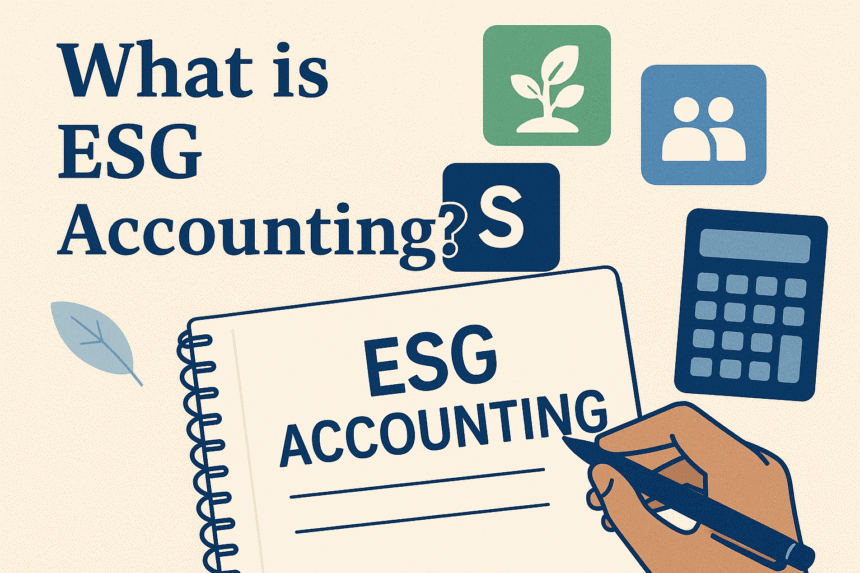Post Author
What is ESG accounting?
The modern business world is changing dramatically and is no longer just focused on making money. Demand for increased corporate accountability is being driven by heightened awareness of social injustices, environmental problems, and corporate governance shortcomings. Investors, consumers, workers, and regulators are among the stakeholders who now demand that businesses show accountability for their wider effects. Environmental, social, and governance (ESG) considerations are now at the forefront of corporate strategy as a result of this change. Therefore, it is essential that these non-financial factors be systematically quantified, analyzed, and reported with the same level of rigor as conventional financial data. The framework required to accomplish this accountability, comparability, and clarity is provided by ESG accounting.
Uncovering ESG Accounting: Broadening the Purview
Compared to traditional financial accounting, which mainly monitors financial transactions and their effects on assets, liabilities, and equity, ESG accounting represents a substantial advancement. By methodically identifying, assessing, evaluating, and reporting a company’s performance across three crucial dimensions, ESG accounting expands this viewpoint:
1. Environmental (E): This pillar looks at how a business interacts with the environment. Metrics like greenhouse gas (GHG) emissions, energy efficiency, waste management, water use, pollution control, and biodiversity conservation initiatives are all quantified. A manufacturing company that uses ESG accounting, for instance, would track its carbon footprint, keep an eye on water use and discharge, put waste reduction plans into place, and evaluate its effects on nearby ecosystems.
2. Social (S): This focuses on how a business interacts with its customers, communities, and employees. Fair labor practices (wages, safety, development), diversity and inclusion, community involvement, human rights protection across the supply chain, and ethical customer relations (fair marketing, product safety) are important areas. Retail companies may report on community investments, workforce diversity, supply chain labor audits, customer feedback systems, and employee satisfaction.
3. Government (G): This pillar evaluates an organization’s internal procedures and systems to guarantee moral behavior, responsibility, and openness. It addresses the independence and makeup of the board, executive pay in line with long-term value, safeguarding shareholder rights, the efficacy of risk management, and anti-corruption initiatives. A technology company would reveal its executive compensation policies, shareholder rights procedures, risk mitigation strategies, board composition, and dedication to moral behavior.
ESG accounting’s primary goal is to provide a comprehensive assessment of a business’s performance and long-term viability. By assessing how a business generates value for all stakeholders, including the environment and shareholders, it assists in identifying ESG-related risks and opportunities.
The Significance of Carbon Accounting
As the climate crisis worsens, carbon accounting has become more important within the environmental pillar. In particular, it entails the methodical measurement and disclosure of greenhouse gas emissions brought on by an organization’s operations. Three scopes are commonly used to classify emissions:
Scope 1: Direct emissions from owned or controlled sources (such as company vehicles, on-site fuel combustion). Scope 2: Indirect emissions from purchased electricity, heat, or steam. Scope 3: Any additional indirect emissions that take place along the company’s value chain, such as emissions from transportation, suppliers, product use, and disposal. Scope 3 emissions are frequently the biggest and hardest to quantify precisely.
Precise carbon accounting is essential. It enables businesses to comprehend their impact on the climate, find opportunities to reduce emissions, set meaningful goals, monitor their progress, and communicate openly with stakeholders—especially investors assessing climate-related risks.
Overcoming Carbon Accounting Difficulties
There are many obstacles in the way of implementing efficient carbon accounting. A significant obstacle is the availability and dependability of data, particularly for Scope 3 emissions across intricate global value chains. Businesses might not be able to see how their many partners are operating.
Inconsistencies are also produced by the lack of globally required, standardized procedures and reporting frameworks. Cross-company comparisons are challenging because, despite the existence of guidelines such as the Greenhouse Gas Protocol, a single global standard is still being developed.
It can be difficult to accurately assign emissions to particular operations, goods, or business divisions; this is especially true in complex global supply chains, where precise estimations and methods are frequently needed.
Using Technology: ESG Software’s Function
In order to handle the complexity of ESG and carbon accounting, technological developments are proving essential. Tools for streamlining data collection, analysis, and reporting are available in the expanding market for ESG software solutions. These platforms incorporate risk management tools, automate data collection, compute GHG emissions across scopes, and align reporting with international standards.
Businesses can automate manual procedures, increase accuracy and dependability, combine data, and obtain actionable insights into their performance by utilizing ESG software. ESG accounting is now more accurate, efficient, and successful in encouraging sustainable practices thanks to this technology.
Emergence of the AI revolution has automated repetitive workflows. For example ESG professionals very often were required to create adhoc reports for management or reply to lengthy ESG questionnaires. All this could now be automated using AI ESG tools like Quikesg.
The Future: Sustainable and Integrated Value Creation
ESG accounting represents a fundamental shift towards a more sustainable business model rather than a passing fad. Strong ESG reporting supported by sound accounting will become crucial for long-term success as stakeholder demands for performance and transparency on environmental and social issues increase.
Businesses that actively adopt ESG accounting will be in a better position to control risks, seize opportunities related to sustainability, draw in investment, improve their reputation, cultivate client loyalty, and help create a more resilient and just future. Even though there are still obstacles in the way of completely standardized procedures, it is indisputable that ESG accounting is crucial for creating value that goes beyond financials. It is a step toward taking into consideration the actual costs and benefits a business provides to all of its stakeholders as well as the environment.





